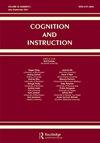Unpacking the Complexity in Learning to Observe in Field Geology
IF 2.3
1区 心理学
Q2 PSYCHOLOGY, EDUCATIONAL
引用次数: 4
Abstract
Abstract Scientific observation is central to classroom inquiry and children’s investigations and explanations in science. Young children can struggle with observation, and research has shown that professional scientists who engage in complex observation tasks, observe detailed patterns when they have well-developed disciplinary knowledge. However, fewer studies address how this observational expertise develops and its specific role as a component of disciplinary knowledge within a larger complex knowledge system. Grounded in an existing theory of conceptual change, Knowledge in Pieces (KiP), we view knowledge as a complex system consisting of both perceptual and inferential parts. We demonstrate how these perceptual and inferential parts can be related to each other in the developing knowledge systems of learners engaged in scientific observation in field geology. In the analysis we examine in-service science teachers’ observations of bedrock while they were aiming to generate an understanding of the relevant historical geological processes. The analysis documents the moment-to-moment complex relationships between the perceptual and inferential parts of a knowledge system and thus offers an empirical account of how observation is situated within a knowledge system. The results challenge the notion that scientific observation is a simple skill by demonstrating how discipline-specific knowledge is mobilized during scientific observation in a field-based setting. This work has implications for science education instruction.解开野外地质学习观察的复杂性
摘要科学观察是课堂探究和儿童科学探究与解释的核心。年幼的孩子可能很难观察,研究表明,从事复杂观察任务的专业科学家,当他们拥有完善的学科知识时,就能观察到详细的模式。然而,很少有研究涉及这种观察性专业知识是如何发展的,以及它在更大的复杂知识系统中作为学科知识组成部分的具体作用。基于现有的概念变化理论,知识碎片(Knowledge in Pieces, KiP),我们认为知识是一个复杂的系统,包括感知部分和推理部分。我们展示了这些感知和推理部分如何在从事野外地质科学观察的学习者发展的知识系统中相互关联。在分析中,我们检查了在职科学教师对基岩的观察,而他们的目的是产生对相关历史地质过程的理解。该分析记录了知识系统的感知部分和推理部分之间时刻到时刻的复杂关系,从而提供了观察如何位于知识系统中的经验说明。研究结果通过展示如何在实地科学观察中调动特定学科的知识,挑战了科学观察是一项简单技能的观念。本研究对科学教育教学具有启示意义。
本文章由计算机程序翻译,如有差异,请以英文原文为准。
求助全文
约1分钟内获得全文
求助全文
来源期刊

Cognition and Instruction
Multiple-
CiteScore
7.90
自引率
12.10%
发文量
22
期刊介绍:
Among education journals, Cognition and Instruction"s distinctive niche is rigorous study of foundational issues concerning the mental, socio-cultural, and mediational processes and conditions of learning and intellectual competence. For these purposes, both “cognition” and “instruction” must be interpreted broadly. The journal preferentially attends to the “how” of learning and intellectual practices. A balance of well-reasoned theory and careful and reflective empirical technique is typical.
 求助内容:
求助内容: 应助结果提醒方式:
应助结果提醒方式:


